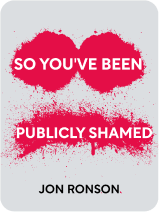

This article is an excerpt from the Shortform book guide to "So You've Been Publicly Shamed" by Jon Ronson. Shortform has the world's best summaries and analyses of books you should be reading.
Like this article? Sign up for a free trial here .
Do you think public shaming is an effective form of punishment? What are the potential consequences of public shaming for the victimized?
Although the methods have changed, public humiliation is still used as a way to inflict punishment for contemptuous behavior, and for a reason—it works. However, public shaming can have serious consequences for the victim because people who’ve been publicly shamed may lose their friends, family, and career, potentially forever.
Keep reading to learn about public shaming, its history, and the consequences for the victimized.
The History of Public Shaming
Public humiliation—whippings in the town square, locking people in the stocks for hours, public executions, and so on—was used to punish criminals in the UK and the US until the 1830s.
- Example #1: If you published “false news”, you would be subject to one of the following: a fine, less than four hours in the stocks, or less than 40 lashings. If you were whipped, newspapers would have reported on the event, going into detail about how much you squirmed.
- Example #2: If you “defiled the marriage bed,” you would be subject to a public whipping with no limitation on lashes and sent to do hard labor for at least a year. A second offense would put you in prison for life.
People were terrified of the shaming element of the punishment. For example, in 1742, a woman was caught cheating on her husband and both the woman and her lover were to be publicly whipped. The woman asked the judge if her whipping could be private so that it wouldn’t embarrass her children—she thought the shaming was the worst part of the punishment, not the physical pain of the whipping.
Many people agreed that public shaming was too brutal and in 1787, US founding father Benjamin Rush added his voice to the growing opposition to public shaming. Rush wrote that public shaming was worse than death and suggested that instead of shaming people, it would be more appropriate to privately administer the gentler punishment of “bodily harm.”
Within fifty years, public punishment was abolished in all states except Delaware. In 1867, an editorial writer tried to explain to Delaware why public shaming was so terrible: it destroyed people’s self-respect to the point that they felt they could never reform. If they couldn’t recover, there was no point trying to become a good citizen. The shamee would be abandoned and criminal forever. (Delaware eventually abolished public punishment in 1952.)
Public shaming was popular during Germany in the Second World War and the Chinese Cultural Revolution—events most people agree were brutal.
Public Shaming Today
According to some people, shame is dying out. For example, in 2008, Daily Mail editor Paul Dacre lamented the lack of shame around sex scandals in a speech to the Society of Editors.
While writing the book, Ronson encountered plenty of people who held the same ideas—that the younger generation doesn’t feel shame anymore and that this is a bad thing.
Shaming on Social Media
In fact, public shaming is experiencing a renaissance on social media. Social media shamings differ from older forms of public punishment because they’re democratic, anonymous, and lawless. Anyone can choose a target, and unlike a formal justice system where the accused has rights, online, no one has any rights. People can be punished without evidence and there’s no time limit on the punishment.
Some people argue that online shaming is just commentary because it can’t hand down “real” punishment, but as we’ve learned, making people feel ashamed is one of the worst punishments out there.
Public shaming on social media can be a force for a good—the public can call out previously inaccessible people and companies for objectively despicable behavior. Shaming can force change that would be time-consuming or impossible to win through the justice system.
● Example #1: After the death of gay singer Stephen Gately, Daily Mail columnist Jan Moir wrote that civil partnerships could never have happily-ever-afters. The public was so angry that Nestlé and Marks & Spencer pulled their advertising from the Daily Mail’s website and the paper lost money.
● Example #2: When a couple lost their jobs and could no longer afford their membership fees to LA Fitness, the company refused to cancel their membership. The internet rallied and LA Fitness allowed the cancellation.
Shaming in the Criminal Justice System
Shame is such an effective way of getting to people that lawyers use humiliation to take down expert witnesses. For example, death row lawyer Clive Stafford Smith comes up with an obscure question that an expert can’t possibly know the answer to. Experts can’t admit they don’t know, because being an expert by nature requires them to be respected and knowledgeable. So they try to address the question, and eventually end up looking stupid and feeling ashamed. This discourages people from challenging him and helps his clients.
Ronson went to a “courtroom familiarization” course to learn more about the use of shame in this context. The instructor, John, started the course by explaining that if an expert was in the way of the lawyer’s goal, the lawyer would try to make the expert look incompetent and lose control.
To induce shame, a lawyer might:
- Act unmoved or bored.
- Feign incredulity by asking, “Really?”
- Pounce on experts who laugh nervously, asking them if they think the situation is funny.
- Stay silent.
To help avoid falling victims to shame, John taught the experts the following techniques:
- Ask the court usher to bring them water and ask the usher to pour the water into a glass for them. This creates time in which to settle the nerves.
- Face the judge when answering the lawyer’s question. Looking at the person who’s tormenting you makes it easier for them to break you down.
Shaming in the Streets
Law enforcement also makes use of shame—it can be an effective way to control people and spaces. For example, being stopped and frisked by police is shameful, even when you’re innocent (and most people are innocent—of the 684,330 stops in New York one year, almost 90% of the people stopped were innocent.) The stop is humiliating because everyone else on
the street who witnesses the police talking to you assumes you’ve done something wrong. Additionally, stopping and frisking people makes them feel violated and scared. All this makes people avoid spaces with high police presence.
Stopping and frisking may be one of the drivers of online activism and public shaming. As the police take over public spaces, there’s nowhere for people to loiter and hang out in real life, so they’re pushed online. The internet is a public space that interests the police too, but unlike on the streets, the average person has power online and can protest the intrusion. According to one young internet whiz, law enforcement is so bad at technology that the only way they can stop it is to lock up hackers and internet geniuses.
Is Shame and Public Punishment Always Effective?
We’ve established that public punishment is brutal, dehumanizing, and can get things done—but does it always work, and are there side effects?
Some people respond very poorly to shame-inducing punishment. For example, Kevin Tunell, like Hubacek, killed someone while driving drunk. The girl’s parents offered to reduce his $1.5 million fine if he would pay them $936 up front and mail them a $1 check in the girl’s name once a week for eighteen years. Tunell accepted the offer, but every time he had to write the girl’s name, he was overwrought with guilt and psychologically tortured, and he eventually stopped sending payments because he couldn’t bear to write the check. When her parents took him to court, he broke down.
Social media shaming can also destroy people. Shaming is very painful, and people who are shamed online can lose their reputation, jobs, friends, and family, potentially forever.
Additionally, even just the threat of public shaming negatively affects people—some people are so scared of being shamed that they worry about being surveilled and tone down their personalities to create a bland online presence. Because public shamings over misunderstandings can be just as brutal as shamings resulting from actual wrongdoing, it’s safest to be mild. Due to these negative effects, Ronson recommends reflecting before shaming anyone online. He no longer shames people unless they’ve victimized someone.

———End of Preview———
Like what you just read? Read the rest of the world's best book summary and analysis of Jon Ronson's "So You've Been Publicly Shamed" at Shortform .
Here's what you'll find in our full So You've Been Publicly Shamed summary :
- How public shaming can ruin people's lives
- Why public shaming isn't just a way to get corporations to do the "right thing"
- 6 strategies you can use if you're a victim of public shaming






